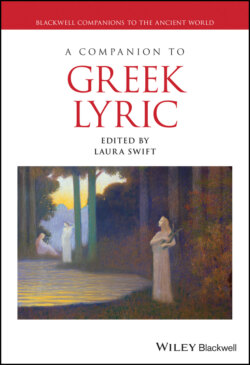Читать книгу A Companion to Greek Lyric - Группа авторов - Страница 10
Preface
ОглавлениеRecent decades have seen a resurgence of interest in Greek lyric, making it one of the most dynamic areas of Classical scholarship. The papyrological discoveries of the twentieth and twenty-first centuries have transformed our knowledge of the corpus of Greek lyric, by both expanding the number of texts available, and allowing us access to a range beyond those selected for quotation in later authors. Meanwhile, new methodological approaches to ancient texts have taken the study of lyric beyond the textual and philological handling of fragments. This volume aims to reflect the current state of play in the study of Greek lyric, and showcase the scope and range of approaches to be found in scholarly work in the field. It also seeks to orient the newcomer to the range of contextual and technical information which is needed to engage with the lyric poets, and to work with texts which are mainly preserved as fragments.
The volume is divided into sections which explore Greek lyric from a variety of different perspectives. Section one situates Greek lyric in its historical and performative contexts. While performance context is an important factor in all Greek literature, the close relationship of lyric poetry with ritual, communal, and social life makes it particularly closely bound to time, location, and occasion. Section two has a two-fold purpose: first, it aims to give a clear overview of the technical issues that particularly apply to dealing with Greek lyric, and which can pose difficulties to those new to the field. These include the transmission of the corpus and how scholars work with papyri and manuscripts, the language of lyric, and the role of meter and music. Second, the section showcases some of the methodologies that characterize modern approaches to lyric poetry, and that can help us read these texts in new ways. Section three provides a detailed overview of the authors and forms that constitute Greek lyric, from our earliest texts in the seventh century BC through to classical Athens and the Hellenistic period. Finally, Section four offers insights into the rich reception history of Greek lyric. This section begins with two chapters on the crucially important Roman reception of Greek lyric, followed by other chapters on how lyric poetry has influenced and inspired writers in the modern era. The latter is not meant to be an exhaustive study (which would easily fill a Companion volume of its own), but offers rather a selection of current research into where and when lyric has inspired later authors.
The volume is intended to be accessible to those with little previous knowledge of Greek lyric, including undergraduate and Masters’ students. Some of the more technical topics by their nature pre-suppose a greater level of previous subject knowledge or linguistic ability: in particular, the chapters on dialects, meter, and papyrology are aimed at a reader with some experience of the Greek language. In the rest of the volume, no knowledge of Greek is assumed, and Greek, where included, is translated. Each chapter is followed by a short guide to further reading, to assist the reader who wishes to know what their next steps could be in learning more about the topic or author, while the bibliography at the end provides a much more extensive list of up-to-date research in the field. The list of abbreviations at the front of the volume includes the standard editions and abbreviations used by scholars working in this field.
A volume of this size owes a great deal to many. I am grateful to the contributors themselves for their hard work and wise insights, to the external readers, who made many helpful suggestions on structure and scope, and of course to those at Blackwell-Wiley who guided it through the process of publication. My editorial work was done during a period of research leave funded by the Leverhulme Trust, and I am grateful to the Trust for their generous support. Particular thanks are due to Bill Allan, for his support throughout, and for the index.
